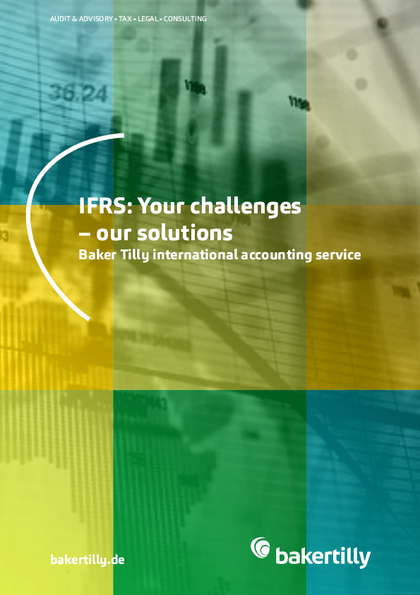The International Financial Reporting Standards (IFRS) issued by the International Accounting Standards Board (IASB) specify the preparation of internationally comparable annual and consolidated financial statements independent of national laws. In connection with internationally operating companies’ financial reporting, IFRS are becoming the preferred standard both in Germany and worldwide.
IFRS: Your challenges – our solutions
Baker Tilly international accounting service
The major difference between financial statements prepared pursuant to IFRS and pursuant to German HGB is the general view on a company: whereas HGB is mainly focused on the protection of creditors, IFRS primarily take into account a company's assets, financial position and profit situation. IFRS provide for the worldwide comparability of capital market oriented companies, thereby protecting investors and strengthening financial markets.
What can we do for you?
Our IFRS specialists support you with regard to all relevant issues in a competent and reliable manner. From the audit of capital market oriented companies or the accounting’s conversion from HGB to IFRS prior to IPO’s or corporate transactions to the support during the introduction of new international reporting standards (such as IFRS 16).
For many years, we have audited listed companies and international groups on the basis of our established IFRS audit approach. We rely on a perfectly structured audit plan (both in terms of time and content) in order to provide for a smooth and experienced procedure – both on a national and an international level.
We develop potential for improvement and efficiency enhancement in accordance with the German Financial Reporting Enforcement Panel’s (Deutsche Prüfstelle für Rechnungslegung; “DPR”) “enforcement procedures”.
All responsible members of our audit team are certified public accountants (under the laws of the relevant jurisdiction). We rely on continuity – thereby securing know-how which provides for quality, efficiency and a reduction of your staff’s workload.
A conversion to IFRS does not only affect financial accounting but also has a significant impact on operating processes and system requirements. Quite often, almost all business divisions are affected, such as internal guidelines, control systems and staff training concepts.
By means of our established Baker Tilly approach we can reliably assume the entire conversion process’s management: from the first analysis of relevant facts (scoping process), the assessment of all accounting issues, the support during the provision of data for the conversion effects and the notes to the results’ final quality assurance review.
An introduction of new reporting standards often requires extensive changes of processes and information flows within a company. Therefore, a systematic approach is imperative.
It all starts with an analysis if and to what extent the new accounting standard is going to affect the company’s accounting system. Such analysis is followed by an assessment of all ramifications for the entire company – based on that, the first implementation measures can be taken. Our experienced IFRS specialists will support you during all process steps. The focus is on enabling your employees to independently and efficiently implement the new requirements subsequent to our support.
After the acquisition of a company, IFRS 3 requires to allocate the paid purchase price to identifiable purchased assets and liabilities – including the previously not recognized undisclosed reserves and undisclosed charges. In particular the valuation of acquired, previously not capitalized intangible assets is often quite difficult for a company as such assets are quite individual and market prices are regularly not available.
Likewise, there are valuation issues in connection with the annual impairment test pursuant to IAS 36. Intangible assets with an indefinite useful life including business values and goodwill require an annual review of their (residual) book value’s recoverability.
A review of a company’s financial reporting by the DPR always involves significant content-related, organizational and time-related challenges for a company, irrespective of a company’s risk of error. For many years, mistakes in connection with the IFRS’s specific application have been one of the DPR’s most frequently identified findings, for example, in connection with the recognition of complex business acquisitions and of financial instruments.
Baker Tilly supports you in providing an efficient and top-quality response to the DPR’s (to some extent quite complex) questions, which often require a fast reply, thereby relieving your staff as far as possible.
In order to ensure the accounting sector’s IPO readiness, we will support you, besides the (initial) preparation of the IFRS accounts, also during all further steps towards your company’s ability to operate on the capital market: the initial preparation of segment reporting, the preparation of interim financial statements (incl. previous year) for prospectus purposes or the adjustment of the information in the management report.
Our IFRS specialists support and strengthen your team in all relevant areas also during the IPO’s critical phase (for example, by providing additional capacities, support during special topics such as the derivation of APMs) in order to ensure the intended capital market transaction’s success.
Difficult accounting issues may result in discussions in connection with an appropriate recognition in the balance sheet. This may include, for example, the introduction of new accounting standards or changes in a company’s operational focus and the correspondingly required adjustments of contracts.
Our Baker Tilly IFRS specialists will support you in such cases with the preparation of expert opinions or assessments regarding the recognition of transactions and contractual relationships. This will provide you with an independent new point of view and, thereby, new arguments which might sustainably contribute to finding a solution.
A conversion to IFRS poses a real challenge to the staff responsible for the preparation of the financial statements. This applies both to an understanding of the relevant standard’s requirements and to the specific implementation in light of the flow of information within the company.
An early and practical training within the scope of our tailor-made IFRS workshop is therefore an integral component in order to ensure a smooth preparation of the financial statements. We offer tailor-made trainings and workshops in order to perfectly prepare our clients to the next reporting season and the new challenges.
Prior to an issue on the capital market for the placement of shares, bonds or other marketable securities, a company must regularly prepare prospectuses containing – based on the company’s IFRS financial statements – information for potential purchasers of securities.
As auditors, we assume the task of preparing a letter on the presented (financial) information (so-called comfort letter). Such letter is addressed both to the company and to the banks accompanying the capital market measure. Therefore, the comfort letter serves as proof that the company prepared the information presented in the prospectus documents with the required diligence.
















